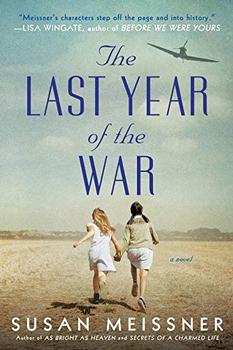Book Club Discussion Questions
In a book club? Subscribe to our Book Club Newsletter!
For supplemental discussion material see our Beyond the Book article, The Internment of Japanese, German and Italian-Americans During WWII and our BookBrowse Review of The Last Year of the War.
Please be aware that this discussion guide will contain spoilers!
- The Last Year of the War is a work of historical fiction, but the internment camp at Crystal City was a real place where families just like Elise Sontag's were detained and then repatriated in prisoner exchanges. How do you feel about what happened during World War II to German Americans like Elise's family? Was such an action justifiable in a time of war? Why or why not?
- What do you think it was like for Elise, going from milk shakes at the local diner in Davenport to living off bread crumbs to survive in Stuttgart after the war? What about her character do you think allowed her to cope with those changes?
- Was Elise's father right to volunteer for Crystal City, knowing that by doing so he and his family might possibly be repatriated?
- Elise's father said the only thing he could do to stand up against the Nazi regime was to make faulty fuses. Was he right? What would you have done?
- Elise seemed changed by the experience in the alley with the two Frenchmen. How do you think it changed her, and why?
- Elise, because of her German heritage, struggles in Chapter 22 to understand how the German military could have been so inhumanely cruel to the prisoners in the concentration camps. She says to the reader, "I was beginning to understand that it was a person's choices that defined his or her identity and not the other way around." Do you agree that our choices say more about who we are than anything else? How does a person's nationality figure into his or her identity?
- What does it mean to you to be a patriot? What do you think it meant to Elise? She tells the reader in Chapter 23, "The land of my childhood mattered to me, maybe because it was where my life began. I felt a part of that land somehow, just as Papa's heart was tied to the land of his birth. It was the land he loved, not so much the people, because people can change. People can be good and people can be monsters." Does the land of your childhood matter to you? Why or why not?
- Has The Last Year of the War prompted you to consider the way in which you see people from other nations?
- Was Ralph a good friend to Elise? Do you think he had his own reasons for marrying her? Did you like him as a person? Why or why not?
- If you had been in Elise's position, would you have married Ralph? Did she make a wise choice or a foolish one?
- Why do you think Elise wanted to return to America and stay with Hugh's family, even though they were difficult in some ways? Do you think she felt her own family was broken somehow by their experience? Do you think she needed to be needed?
- What do you think were the reasons Mariko's friendship had such an impact on Elise? Can you relate? Did you have a friend like this growing up? How are we shaped by our friendships when we're young?
- Do you think Elise would have ended up being a different person if she hadn't met Mariko? If so, how?
- Mariko says from her deathbed that because of her, she and Elise were lost to each other. She laments that had she made different choices, she and Elise could have stayed friends. Elise assures Mariko that they did remain friends. Did they? Of Mariko, Elise tells the reader, "She remained in my heart and I in hers, all these years." What was Elise saying? Do you think it's possible to retain a friendship when you are parted from that friend?
- Elise describes her Alzheimer's as a sticky-fingered houseguest named Agnes who is stealing from her. What is Agnes taking from Elise? How does this predicament tie into the rest of the story?
Unless otherwise stated, this discussion guide is reprinted with the permission of Berkley Books.
Any page references refer to a USA edition of the book, usually the trade paperback version, and may vary in other editions.
For supplemental discussion material see our Beyond the Book article, The Internment of Japanese, German and Italian-Americans During WWII and our BookBrowse Review of The Last Year of the War.
